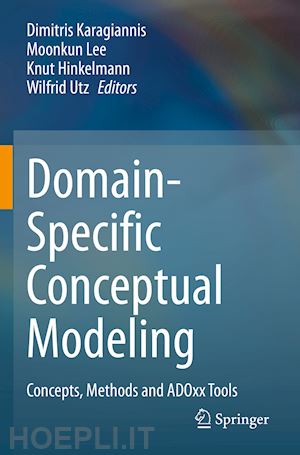

Questo prodotto usufruisce delle SPEDIZIONI GRATIS
selezionando l'opzione Corriere Veloce in fase di ordine.
Pagabile anche con Carta della cultura giovani e del merito, 18App Bonus Cultura e Carta del Docente
This book demonstrates the significance of domain-specific conceptual modeling through new research and development approaches that are manifested in each of the chapters. They include novel modelling methods and tools that emphasize the recent results accomplished and their adequacy to assess specific aspects of a domain.
Each chapter offers detailed instructions on how to build models in a particular domain, such as product-service engineering, enterprise engineering, digital business ecosystems, and enterprise modelling and capability management. All chapters are enriched with case studies, related information, and tool implementations. The tools are based on the ADOxx metamodelling platform and are provided free of charge via OMiLAB. Furthermore, the book emphasizes possible future developments and potential research directions.
The collection of works presented here will benefit experts and practitioners from academia and industry alike, including members of the conceptual modeling community as well as lecturers and students.Part I: Background.- 1. Conceptual Modelling Methods: The AMME Agile Engineering Approach.- 2. Development of Conceptual Models and Realization of Modelling Tools Within the ADOxx Meta-Modelling Environment: A Living Paper.- 3. Challenging Digital Innovation Through the OMiLAB Community of Practice.- Part II: Previous Volume: Synopsis.- 4. The Purpose-Specificity Framework for Domain-Specific Conceptual Modeling.- Part III: Enterprise Management.- 5. Enterprise Modeling with 4EM: Perspectives and Method.- 6. PGA 2.0: A Modeling Technique for the Alignment of the Organizational Strategy and Processes.- 7. The LiteStrat Modelling Method: Towards the Alignment of Strategy and Code.- 8. itsVALUE: Modelling and Analysing Value Streams for IT Services.- Part IV: Enterprise Information Systems.- 9. Enterprise Construction Modeling Method.- 10. Tool Support for Fractal Enterprise Modeling.- 11. The Integration of Risk Aspects into Business Process Management: The e-BPRIM Modeling Method.- 12. Modeling the Phenomenon of Capability Change: The KYKLOS Method.- 13. A Security Assessment Platform for Stochastic Petri Net (SPN) Modelling in the Internet of Things (IoT) Ecosystem.- Part V: Business Ecosystems and Services.- 14. A Modeling Tool for Exploring Business Ecosystems in a (Pre-)conceptual Phase.- 15. A Capability-Based Method for Modeling Resilient Data Ecosystems.- 16. Space of Services Method (SoS).- 17. Design and Engineering of Product-Service Systems (PSS): The SEEM Methodology and Modeling Toolkit.- Part VI: Knowledge Engineering.- 18. Model-Based Guide Toward Digitization in Digital Business Ecosystems.- 19. Generating ROS Codes from User-Level Workflow in PRINTEPS.- 20. ECAVI: An Assistant for Reasoning About Actions and Change with the Event Calculus.- Part VII: Technology Enhanced Education.- 21. Tree Diagrams and Unit Squares 4.0: Digitizing Stochastic Classes with the Didactic Modeling Tool PROVIS.- 22. Improving Student Mobility Through Automated Mapping of Similar Courses.- Part VIII: Digital Humanities.- 23. Aggregation and Curation of Historical Archive Information.- Part IX: Modelling Method Conceptualization.- 24. Conceptualization of Modelling Methods in the Context of Categorical Mechanisms.- 25. Conceptualizing Design Thinking Artefacts: The Scene2Model Storyboard Approach.- 26. An Approach to the Information System Conceptual Modeling Based on the Form Types.- Part X: Conceptual Modelling Language Extension.- 27. BPMN4MoPla: Mobility Planning Based on Business Decision-Making.- 28. BPMN Extension for Multi-Protocol Data Orchestration.
Moonkun Lee is Full Professor for Computer Science and Engineering at Jeonbuk National University (JBNU) in the Republic of Korea since 1996. His main research interests are software round-trip engineering, distributed real-time systems, formal methods, ontology, and behavior engineering. Currently he focuses on the specification, analysis, verification, and the implementation of cyber-physical systems for smart cities and industry applications.
Knut Hinkelmann is Professor for Information Systems and Head of the Master of Science in Business Information Systems at the FHNW University of Applied Sciences and Arts Northwestern Switzerland, where he also is head of the research group Intelligent Information Systems. He is also Managing Director of OMiLAB since 2020. His research interests are Enterprise Modeling and Artificial Intelligence.
Wilfrid Utz is one of the Managing Directors of OMiLAB, the non-profit organisation supporting the conceptual modelling community organized around emerging topics with respect to domain-specific conceptual modelling. He completed his PhD thesis in 2020 at the University of Vienna in the field of meta-model design and knowledge representation using conceptual structures and has been involved in numerous international research and innovationprojects.











Il sito utilizza cookie ed altri strumenti di tracciamento che raccolgono informazioni dal dispositivo dell’utente. Oltre ai cookie tecnici ed analitici aggregati, strettamente necessari per il funzionamento di questo sito web, previo consenso dell’utente possono essere installati cookie di profilazione e marketing e cookie dei social media. Cliccando su “Accetto tutti i cookie” saranno attivate tutte le categorie di cookie. Per accettare solo deterninate categorie di cookie, cliccare invece su “Impostazioni cookie”. Chiudendo il banner o continuando a navigare saranno installati solo cookie tecnici. Per maggiori dettagli, consultare la Cookie Policy.